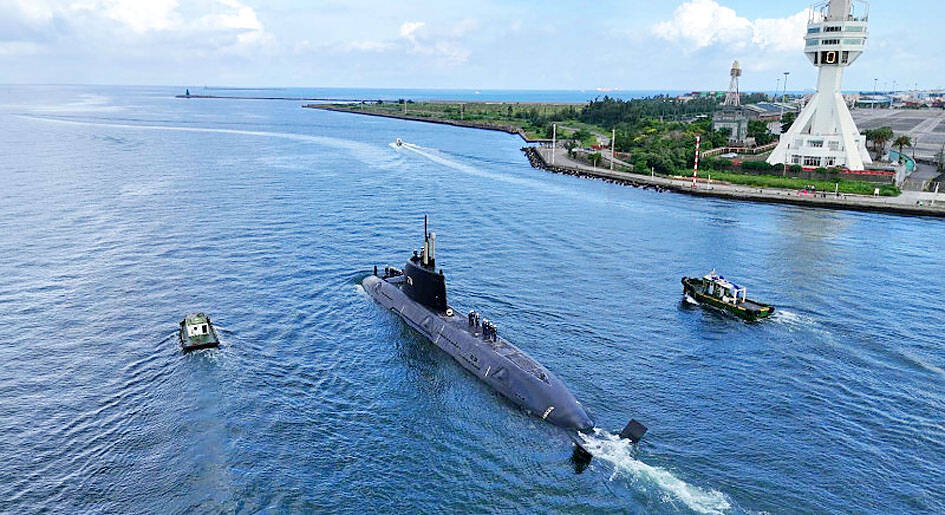Minister of National Defense Wellington Ku (顧立雄) yesterday said that it would be “challenging” for the builder of the Hai Kun (海鯤) submarine to deliver the ship to the navy next month, as equipment tests and calibration take time.
Ku spoke of progress in readying Taiwan’s first indigenous submarine before attending a briefing at the legislature’s Foreign Affairs and National Defense Committee.
“I am confident that the submarine would eventually be completed, but the testing and calibration would take time, and it would be extremely challenging to complete them for delivery to the navy next month,” Ku said.

Photo courtesy of CSBC Corp, Taiwan
The submarine project’s progress was supported by legislators across party lines after the confidential briefing, the navy said in a statement at noon yesterday.
Legislators urged verifying the safety and quality of the submarine before proceeding to sea trials, a navy spokesperson added.
Testing the prototype submarine is being conducted in three phases: surface navigation tests, shallow-water diving tests and deep-water diving tests, the navy said, adding that the submarine entered the surface navigation testing phase on June 17.
So far, three surface navigation tests had been conducted to verify integrated functions of various systems, including propulsion, navigation instruments, communications systems, ship control and periscopes, the navy said.
The submarine was evaluated at CSBC Corp’s dry dock from July 8 to Sept. 2 in three major areas: hull watertightness inspection, equipment calibration, and inspection and maintenance of combat systems, the navy said.
For sea trials, preparations have been completed for the combat and sonar systems, as well as main hydraulics and submarine ballast systems, the navy said.
However, two system groups — the main engine and power management system, and the integrated platform management system (IPMS) — still require testing before the submarine meets the necessary preconditions for diving tests.
Testing of the main engine and power management system takes more time, as it involves multiple contractors and requires coordination to arrange the testing schedule, the navy said, dismissing claims that it had encountered technical issues.
The testing is critical, as it would verify the main engine’s seaworthiness to ensure the vessel’s stability and functionality underway, it said.
Meanwhile, IPMS is a highly automated and integrated system capable of remotely operating and monitoring equipment aboard, the navy said, adding that the hardware of the system has undergone testing, with software modifications and validations ongoing.
CSBC has dispatched additional software engineers to work alongside the original manufacturer to accelerate completion, the navy said.
The testing results of the two systems would be jointly evaluated by the project team, foreign consultants, and the navy officers operating the submarine, the navy said, adding that only after meeting the necessary conditions for safe diving would sea trials be scheduled.
Shallow-water diving tests primarily verify functions related to ship handling, intelligence-gathering equipment, emergency systems and combat management, while deep-water diving tests add functional verification of the vessel’s performance capabilities.

Foreign travelers entering Taiwan on a short layover via Taiwan Taoyuan International Airport are receiving NT$600 gift vouchers from yesterday, the Tourism Administration said, adding that it hopes the incentive would boost tourism consumption at the airport. The program, which allows travelers holding non-Taiwan passports who enter the country during a layover of up to 24 hours to claim a voucher, aims to promote attractions at the airport, the agency said in a statement on Friday. To participate, travelers must sign up on the campaign Web site, the agency said. They can then present their passport and boarding pass for their connecting international

Three Taiwanese airlines have prohibited passengers from packing Bluetooth earbuds and their charger cases in checked luggage. EVA Air and Uni Air said that Bluetooth earbuds and charger cases are categorized as portable electronic devices, which should be switched off if they are placed in checked luggage based on international aviation safety regulations. They must not be in standby or sleep mode. However, as charging would continue when earbuds are placed in the charger cases, which would contravene international aviation regulations, their cases must be carried as hand luggage, they said. Tigerair Taiwan said that earbud charger cases are equipped

Temperatures in northern Taiwan are forecast to reach as high as 30°C today, as an ongoing northeasterly seasonal wind system weakens, the Central Weather Administration (CWA) said. CWA forecaster Tseng Chao-cheng (曾昭誠) said yesterday that with the seasonal wind system weakening, warmer easterly winds would boost the temperature today. Daytime temperatures in northern Taiwan and Yilan County are expected to range from 28°C to 30°C today, up about 3°C from yesterday, Tseng said. According to the CWA, temperature highs in central and southern Taiwan could stay stable. However, the weather is expected to turn cooler starting tonight as the northeasterly wind system strengthens again

COOLING OFF: Temperatures are expected to fall to lows of about 20°C on Sunday and possibly 18°C to 19°C next week, following a wave of northeasterly winds on Friday The Central Weather Administration (CWA) on Sunday forecast more rain and cooler temperatures for northern Taiwan this week, with the mercury dropping to lows of 18°C, as another wave of northeasterly winds sweeps across the country. The current northeasterly winds would continue to affect Taiwan through today, with precipitation peaking today, bringing increased rainfall to windward areas, CWA forecaster Liu Pei-teng (劉沛滕) said. The weather system would weaken slightly tomorrow before another, stronger wave arrives on Friday, lasting into next week, Liu said. From yesterday to today, northern Taiwan can expect cool, wet weather, with lows of 22°C to 23°C in most areas,